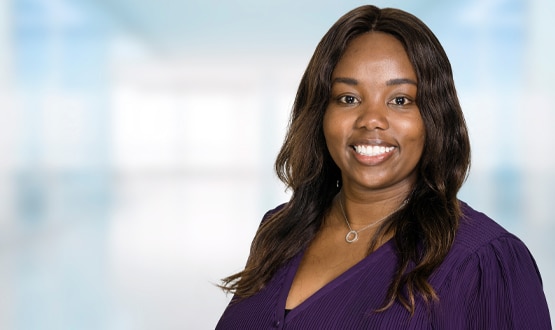Industry Spotlight: Esther Gathogo, Senior Performance Improvement Leader, Oracle Health
- 16 December 2022

Curiosity and the desire to make a difference have always been guiding forces for Esther Gathogo. At Oracle Health, she is digitising pathways to standardise care and transform information into something meaningful, a process that has huge potential to improve health outcomes.
Esther Gathogo is constantly keen to learn. Whether she’s climbing some of the world’s highest mountains or diving in its deepest oceans, she’s always gathering information – and looking at how she can apply it to make a difference.
The same is true of her working life. As a senior performance improvement leader with Oracle Health, and a clinical pharmacist by background, she is passionate about using data and digital innovation to advance health equity and equality at scale.
“Different mountains offer different things,” says Dr Gathogo, who numbers Mount Kenya and Mount Kilimanjaro among her achievements. “You get to learn all these different things about plants and wildlife for example, and the communities that live around them and who take care of the mountain. For example, Mount Kenya has 25 lakes and waterfalls and interesting plants like giant groundsel that survive on chilly slopes for more than 200 years. It’s fascinating. It’s hard work, of course, sometimes you’re almost crying. But when you get to the top, it’s absolutely breathtaking.”
Solutions with empathy
Part of her core role is digitising pathways to standardise care and reduce unwarranted information. This process, she says, has huge potential to improve services and health outcomes. “I’m interested in how we capture, store, extract and transform information – with data quality and integrity – turning it into something that’s meaningful, and that helps people designing these solutions with empathy and compassion,” she says.
Anywhere you are in the NHS, you should be able to expect the same excellent experience, says Dr Gathogo. “Wherever you are, you should be able to get access to care and to get great health outcomes out of the care you’re receiving. When you’re saying that, it’s really loaded because you have to think about so many different things, including the workforce itself, the culture of the organisation, and how care is delivered.”
She has worked collaboratively on more than 40 pathways, which has involved garnering information from the existing electronic patient record – seeing the different ways that people record and store that information, then working with an organisation to standardise the way that care is delivered and recorded.
“If, for example, we were looking at digitising diabetes care in hospital, we would bring in the standards of care – the best quality of care – through the digital [pathway]. We’d be working with clinicians to make sure they’re aware of the latest guidance and incorporating it in their work, making it easy for them to interact with the computer system.”
Push for improvement
Through data, it’s also possible to show that you have been able to reduce variation, she adds. “You can see if you’ve been able to achieve improvements in clinical efficiency, operational efficiency, financial efficiency, or whatever aims you have for that pathway – and for the population,” she says. “And over time, because of digital pathways and the way you design them, you have the potential to address some of the challenges of unstructured care data.”
Having that rich pool of information, with all clinicians documenting care in the same way, leads to important insights into the care of patients, and what works best. Again, this is all part of a constant push for improvement, enabled by digitisation, bringing in information from numerous sources and sectors, and the meaningful deployment of data.
The potential of digital, data and of science to unlock better outcomes for patients is something that Dr Gathogo recognised early in her career. When she was a pharmacist at London’s Royal Free Hospital, she was given the opportunity to work in different specialisms and take on leadership roles such as a prestigious Darzi fellowship. She moved from working with people with HIV to the renal ward, and it was there that she had a revelation.
Transformation in action
A patient told her his kidney failure was caused by HIV, and that the only real option for treatment was dialysis, for many hours at a time, several times a week. “He said kidney transplantation wasn’t an option for HIV patients. That sparked my curiosity because I was trying to understand why, from a clinical and medical perspective.”
She was inspired to undertake her PhD into HIV kidney transplantation, working with colleagues locally and then nationally on how to make it a realistic option for people with HIV who needed a new kidney. This brought home to her the value of standardised information, as it could be tough to bring together data from a large number of centres – and also gave her insights in how to make it work.
During the six years she studied part-time for her PhD, Dr Gathogo continued working as a clinical pharmacist, so was able to see at first hand the impact of her academic work on patients. “I was so grateful to the doctors and other staff for taking me on that journey with them – we ended up being the largest centre in Europe in terms of transplanting HIV-positive patients.
“What I love about being in clinical practice is that I was hearing from patients about the difference it had made to their lives – they could hold down a job, go back to school, have a baby. It was seeing transformation in action.”
Fascinating science
Seeing the impact of research at a global level has made her excited to work with Oracle Health, she says, because of its international reach. “They’re transforming lives on an individual level, but also a macro level as well.”
That ongoing curiosity and desire to make a difference also inspires Dr Gathogo in her other roles – she is, for example, a digital pharmacy expert for the Royal Pharmaceutical Society of Great Britain, where, for example, she co-chairs the AI subgroup and is working on development of policy on health inequalities to improve service provision and access for patients.
Outside work, she has also recently won her licence as a PADI scuba diver, and plans to volunteer to improve the health of communities that rely on and look after the ocean. “There’s a whole other world down there, and the science is just fascinating.
“There’s so much we can do with our lives – we’re living in the story, and we’re writing the story, and we just need to get out and do it.”
Contact Oracle Health:
Website: www.cerner.com/gb/en
Twitter: @cernerUK
Linkedin: Oracle Health




